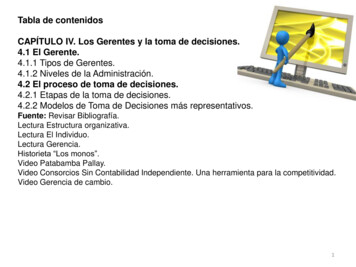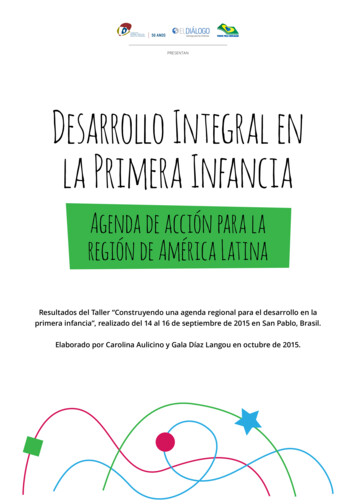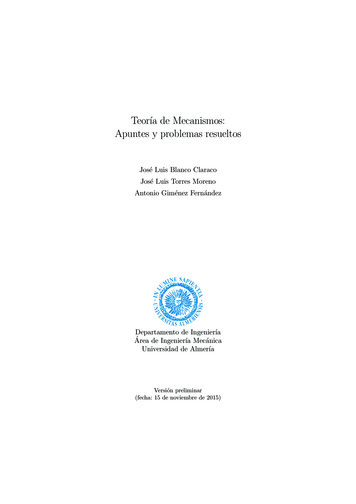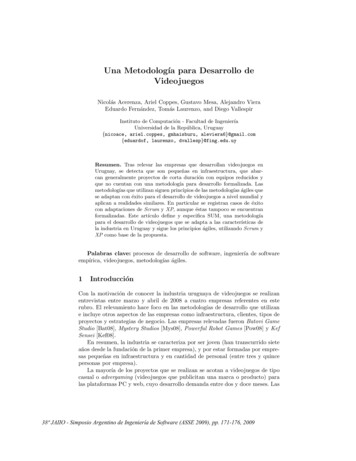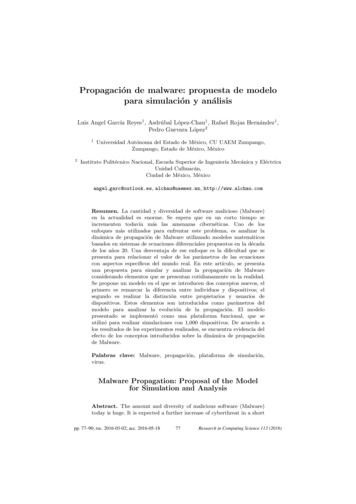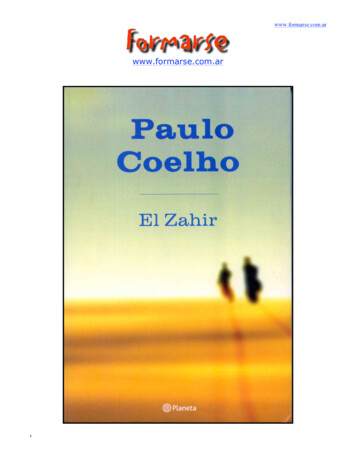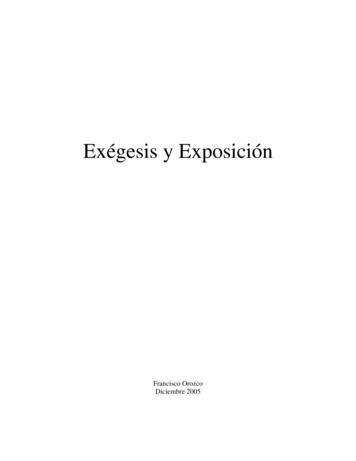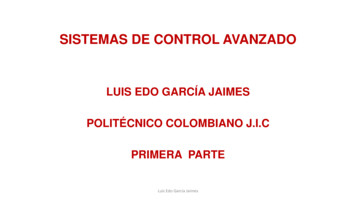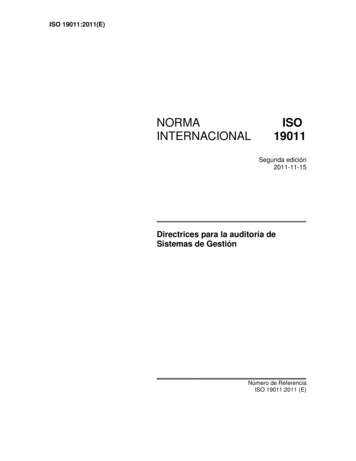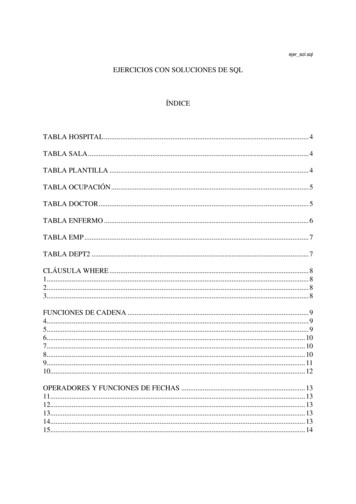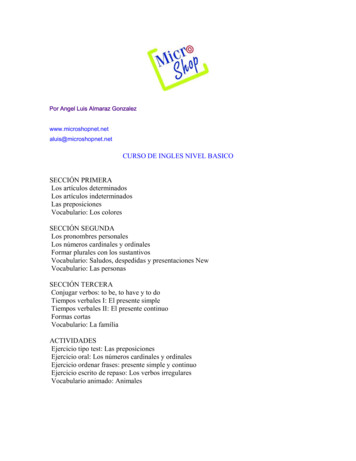
Transcription
Por Angel Luis Almaraz CURSO DE INGLES NIVEL BASICOSECCIÓN PRIMERALos artículos determinadosLos artículos indeterminadosLas preposicionesVocabulario: Los coloresSECCIÓN SEGUNDALos pronombres personalesLos números cardinales y ordinalesFormar plurales con los sustantivosVocabulario: Saludos, despedidas y presentaciones NewVocabulario: Las personasSECCIÓN TERCERAConjugar verbos: to be, to have y to doTiempos verbales I: El presente simpleTiempos verbales II: El presente continuoFormas cortasVocabulario: La famíliaACTIVIDADESEjercicio tipo test: Las preposicionesEjercicio oral: Los números cardinales y ordinalesEjercicio ordenar frases: presente simple y continuoEjercicio escrito de repaso: Los verbos irregularesVocabulario animado: Animales
El artículo determinante o definidoEl artículo definido o determinante se traduce en inglés por The. Es invariable ycorresponde a las formas españolas el, la, los, las.Ejemplos:TheTheTheTheTheTheboy (el niño)boys (los niños)girl (la niña)girls (las niñas)book (el libro)books (los libros)El artículo definido puede ir precedido de las preposiciones of, to. En inglés no haycontracción de preposición y artículo: del y al se traducen por of the ( del) to the (ael).EjemplosOf the village. (del pueblo)Of the house. (de la casa)To the garden (al jardín)To the door (a la puerta)Usos del artículo the:Cuando sabemos de quien o de que estamos hablando.Cuando hablamos de algo que lo hemos mencionado en una frase anterior.Con los adjetivos en grado superlativo.Con los sustantivos cuando indican un tipo o clase en general.Con los nombres propios de océanos, mares, montañas, naciones en plural.Con los adjetivos abstractos.EjemplosCan I have the drink? (¿puedo tomar la bebida?) cuando sabemos de que bebidahablamos.Mr and Mrs Jones have a daughter and two sons. The daughter is a doctor.(El sr. y la sra. Jones tienen una hija y dos hijos. La hija es doctora)She is the best. (ella es la mejor)The ants are workers. (las hormigas son trabajadoras)The Alps. (los alpes)The fantastic (lo fantástico)Casos en los que no usamos el artículo the:Cuando hablamos de algo en general.Delante de términos geográficos o topónimos.Delante de nombres de personas aunque estos estén precedidos de títulos.Delante de meses, estaciones y días festivos.Delante de las comidas generales como almuerzo, cena.Cuando hablamos de partes del cuerpo usando el verbo to have (tener)
Delante de next (próximo, siguiente) y last (último, pasado)Ejemplos:Houses are expensive. (las casas son caras)Life isn't easy. (la vida no es fácil)Fifth Avenue. (la quinta avenida)Spain. (España)King Charles (el rey Carlos)We see you in September. (te veremos en septiembre)El artículo indeterminado a / anA o an, corresponde los siguientes artículos en spañol: un, una.A se usa con nombres que comienzan por consonante.ejemplos:a book un libroa pen un bolígrafoa chair una sillaAn se usa con nombres que comienzan por vocal.ejemplos:an animal un animalan answer una contestaciónan example un ejemploUsamos a antes de una palabra comenzada por la letra ucuando esta es pronunciada como el sonido figurado "yu".ejemplo: a universityUsamos an antes de una palabra comenzada por una h que nopronunciamos.ejemplo: an hourUsos del artículoUsamos a / an delante de los nombres singulares.ejemplo: Have you got a bicycle? (¿tienes una bicicleta?)I've got an umbrella. (Yo tengo un paragüas)Usamos a / an cuando hablamos del oficio de alguién.ejemplo: Maria is a journalist. (Maria es una periodista)
Tom Cruise is an actor (Tom Cruise es un actor)No usamos a / an delante de nombres plurales.ejemplo: Have you got two bicycles? (¿tienes dos bicicletas?)Las preposicionesDe tiempo y lugarONSignificado: sobre, encima de, de, alUsos:delante de: días,días concretos, días meses, fechas, partes del díaEjemplos:My flat is on the first floor. (mi piso está en la primera planta)You don't work on Sunday. (tu no trabajas el domingo)On 10th june. (el 10 de junio)They go to church on Christmas day. (ellos van a la iglesia en el día de Navidad)INSignificado: en, dentro, dentro de, hacia adentro.Usos:delante de: meses, años, estaciones, partes del día.Ejemplos:I live in Brighton. (vivo en Brigthion)My birthday is in June (mi cumpleaños es en junio)I was born in 1970. (nací en 1970)We often go swimming in the summer. (nosotros solemos ir a nadar en verano)We usually watch TV in the evening (nosotros solemos ver la televisión al anochecer)ATSignificado: en, a, por, delante, cerca deUsos:delante de:horas, días festivos, weekend (fin de semana) a excepción de US que sería on weekend, night (noche),home (casa) significando estar en casa.Ejemplos:I live at 42 Porltand Street. ( vivo en el 42 de Portland Street )He is at home (él esta en casa )I usually get up at 7 o'clock. (normalmente me levanto a las 7 en punto)
I always visit my parents at Chirstmas (siempre visito a mis padres en Navidades)I usually play tennis at weekends. (acostumbro a jugar al tenis en los fines de semana)nota: at the end significa al final ejemplo: At the end of my holiday. (al final de mis vacaciones)a diferencia de in the end que se traduce como "al fin y al cabo".De lugar y movimientoOppositeSignificado: contrario, en frente deEjemplo:The hotel is opposite the station. (el hotel está en frente de la estación)On the cornerSignificado: en la esquinaEjemplo:The bank is on the corner. (el banco está en la esquina)BetweenSignificado: entreEjemplo:The shop is between the baker's and the station. (la tienda está entre la panaderia y laestación)In front ofSignificado: enfrente de, delante deEjemplo:There is a bus stop in front of the flower shop. (hay una parada de bus en frente de lafloristería)NearSignificado: cercaEjemplo:The school is near the bank. (la escuela está cerca del banco)BehindSignificado: detrás deEjemplo:The church is behind the school. (la iglesia está detrás de la escuela)Next toSignificado: a continuación de, al lado deEjemplo:It's next to the chemist's. (está junto a la farmácia.)Into, out ofSignificado: dentro deEjemplo:The woman is diving into the water (la mujer esta zambulléndose dentro del agua)Out ofSignificado: fuera deEjemplo:
My mother is out of the room. (mi madre está fuera de la habitación)Los �ngreenverdegreygrisnavyazul marinoorangenaranjapinkrosapurplevioleta / moradoredrojowhiteblancoyellowamarillo
De sujetoEjemploTraducción ejemploIyoI am ill.Yo estoy enfermo.Youtú, ustedYou are hungry.Tú estás hambriento.HeélHe is handome.Él es guapo.SheellaShe is pretty.Ella es guapa.Itél, ellaIt's cold today.Hoy hace frío.(este pronombre amenudo se omite)WenosotrosWe are tired.Nosotros estamos cansados.Youvosotros, ustedesYou are angry.Vosotros estáis enfadados.Theyellos, ellasThey are at the cinema.Ellos están en el cine.EjemploTraducción ejemploDe adjetivoMymi, misThis is my bluseEsta es mi blusa.Yourtu, tusThis is your tieEsta es tu corbata.Hissu, sus (masculino)This is his wardrobeEste es su vestuarioHersu, sus (femenino)This is her dressEste es su vestido.Itssu, susThis is its collarEste es su collar.Ournuestro/s nuestros/asThese are our suitcases.Estas son nuestras maletas.Yourvuestro/a, vuestros/asThese are your seats.Estos son vuestros asientos.Theirsu, sus (de ellos)Here are their socks.Aquí están sus calcetines.EjemploTraducción ejemploDe objetoMeme, míI want it for me.Lo quiero para mí.Youte, tu, tí, ustedI 'm helping you.Te estoy ayudando a tí.Himél, le, loCan you see him?Le puedes ver?Herella, le, laShe is pretty. I like her.Ella es bonita. Me gusta ella.Itlo, la, ello, leGive it a kick.Dale una patada.Usnosotros, nosHe is helping us.Él nos está ayudandoI saw you.Les vi.I 'm waiting for them.Los estoy esperando.EjemploTraducción ejemploYouThemvosotros, les, ustedes,osellos, les, los, las,PosesivosMinemío/s, mía/sThis coat is mine.Este abrigo es mío.Yourstuyo/s, tuya/sMy name is Tony. What's yours?Mi nombre es Tony. Cuál es el tuyo?Hissuyo/s, suya/s(de él)This is his computer.Esta es su computadora .Herssuyo/s, suya/s(de ella)Hers bag is blue.Su bolso es azul.Itssuyo/s, suya/sIts eyes are blue.Sus ojos son azules.Oursnuestro/s, nuestra/sThe suitcases are ours.Las maletas son nuestras.Yoursvuestro/a, vuestros/as,The handicap is yours.La desventaja es vuestra.This is theirs.Esto es suyo.EjemploTraducción ejemploTheirsReflexivossuyo/a, suyos/as (deellos )
Myselfyo mismo, meI saw it for myself.Yo mismo lo vi.Yourselftú mismo, te, seDon't burn yourself !No te quemes!Himselfél mismo, seHe hurt himself.Se hizo daño.Herselfella misma, seShe did it herself.Lo hizo ella misma.Itselfél mismo, seThe cat scratched itself.El gato se arañó.Ourselvesnosotros mismos, nosWe are enjoying ourselves.Estamos disfrutando nosotros mismos.Did you paint the house yourselves?Pintásteis la casa vosotros mismos?They are laughing at themselves.Ellos se están riendo.They hate each other.Ellos se odian.YourselvesThemselvesEach othervosotros mismos,ustedes mismos, seellos mismos, seel uno del otro, seLos números cardinalesDel 1 al 12:one, two, three, four, five, six, seven, eight, nine, ten, eleven, twelve.Del 13 al 19 tienen la terminacion -een (la terminación suena como tin ):thirteen, fourteen, fifteen, sixteen, seventeen, eighteen, nineteen.20, 30, 40, 50, 60, 70, 80, 90 tienen la terminación -ty ( la terminación suenacomo ti ):twenty, thirty, forty, fifty, sixty, seventy, eighty, ninetyPara formar las decenas se añade un guión después de la decenas y el número:twenty-one, twenty-two, twenty-three. (ventiuno, ventidos, ventitres.)forty-one, fifty-two, ninety-eight. (cuarenta y uno, cincuenta y dos, noventa yocho.)Para las centenas sería:a / one hundred, two hundred .(cien, doscientos.)Para unir las centenas con las decenas se le añadirá and .two hundred and fifty-five. ( doscientos cincuenta y cinco)
Para los millares sería:a / one thousand, two thousand. (mil, dos mil.)Para los millones sería:a / one million, two million. (un millón, dos millones.)Ejemplosa / one hundred and two (102)three hundred and twelve (312)five thousand and ten (5.010)two million five hundred thousand (2.500.000)six thousand two hundred and seventy - nine ( 6.279)two thousand two hundred and twenty -two (2.222)three thousand three hundred and thirty -three (3.333)Los números ordinalesPrimero, segundo y tercero son así:1st first, 2nd second, 3rd third.Del cuarto al decimoavo tienen la terminación -th:4th fourth, 5th fifth, 6th sixth, 7th seventh, 8th eighth, 9th ninth, 10th tenth,11th eleventh12th twelfth, 13th thirteenth, 14th fourteenth, 15th fifteenth, 16th sixteenth.Las decenas, millares y el millón también tienen la terminación -th:20th twentieth, 30th thirtieth, 40th fortieth, 80th eightieth . (la terminaciónsuena como tiez )100th hundredth, 1000 thousandth, 1.000.000th millionthPara formar las decenas, al igual que los cardinales, pero la terminación -th latienen lasunidades, las decenas entonces se escribirán como los cardinales.21st twenty-first, 22nd twenty-second, 23rd twenty-third, 24th twenty-fourthNota: Al poner el número solo, se le añade la terminación de este, quesiempre será -th, excepto el primero, segundo y tercero que son diferentes alresto, en los cuales sería terminación -st, -nd y -rd.
Singular y plural de los sutantivosReglas gramaticalesA la mayoria de nombres se les agrega una s final para formar el plural.ejemploscamera / cameraspen / penscup / cupscar / carsPara formar el plural a los nombres acabados en -ch, -sh, -s, o -x, se les añade -es.ejemplosglass / glasseswatch / watchesbrush / brushesbus / busesbox / boxesPara formar el plural a los nombres acabos en -y se elimina la letra y y se añade laterminación -ies.ejemploscity / citiesparty / partiesPara los acabados en -f o -fe se elimina la -f o -fe y se añade -ves.ejemploswife / wivesMuchos sustantivos se pluralizan de un modo irregular, existen dos casos:caso 1Cuando el singular y plural no cambian.ejemplosfish (pez o pescado) singularfish (peces o pescados) pluralsheep (oveja) singularsheep (ovejas) pluralcaso 2Cuando el plural varía de modo irregular. Por lo tanto, no existe regla la cual se puedaseguir y hay que aprenderse las formas irregulares de cada entes
footpiefeetpiesmouseratónmiceratonesSaludos, despedidas y presentacionesBuenos díasGood morningBuenas tardesGood afternoonBuenas nochesGood eveningBuenas nochesGood night¡Adios!Bye, Good bye¡Hasta luego!See you later!¡Hasta pronto!See you (soon)!¡Hasta mañana!See you tomorrow!¡Hola!Hi! Hello!(también en inglés americano: howdy! hiya!)¿Cómo estás?How are you?¿Qué tal?How are things?¿Qué tal?How are you getting on?fine, thanksbien, gracias¿A qué te dedicas?What do you do?
¿Cómo te llamas?What's your name?¿Puedo presentarme?May I introduce myself?Quisiera que conociese a.I'd like you to meet.Le presento a .Let me introduce you to .Encantado, Mucho gustoNice / pleased to meet you.¡Mucho gusto! / Cómo les va?How do you do?¿Cómo está tu familia?How's your family?¿Tu familia está bien?Is your family well?Salúdalos en mi nombre.Give them my kindest regards.¡buena suerte!All the best!Estoy a tu disposición.I am at your disposal.Recuerdos a todos.Kind regards to everybody.Recuerdos! / Mis mejores deseos!Best wishes!Las dultobabybebéboychico
eñor, oladyseñoramanhombremiddle-agedde mediana centetoddlerniño que empieza ón verbo be (ser o estar)infinitivo: to bepresente: am / is / arepasado: was / wereparticipio: beenModo indicativoPresente (present): yo soy, tú eres, él es .sintaxis: sujeto presenteI amIt isYou areWe areHe isYou areShe isThey are
Pluscuamperfecto (past perfect): yo había / hube sido, tú habías /hubiste sido, él había /hubo sido.Pretérito imperfecto /pasado simple (past simple): yo era, tú eras, él era.sintaxis: sujeto pasado del verboI wasIt wasYou wereWe wereHe wasYou wereShe wasThey werePretérito perfecto compuesto (present perfect): yo he sido, tú has sido, él ha sido.
He will have beenYou will have beenShe will have beenThey will have been.Condicional (conditional): yo sería, tú serías, él sería.sintaxis: sujeto would/should modo infinitivo del verboI would beIt would beYou would beWe would beHe would beYou would beShe would beThey would beCondicional perfecto (past conditional): yo habría o hubiera sido, tú habrías o hubieras sido.sintaxis: sujeto would have participio del verboI would have beenIt would have beenYou would have been We would have beenHe would have beenYou would have beenShe would have been They would have beenModo SubjuntivoPresente subjuntivo: Yo sea, tú seas, él sea.sintaxis: sujeto infinitivoI beIt beYou beWe beHe beYou beShe beThey bePretérito imperfecto: yo fuera, tú fueras, él fuera.sintaxis: sujeto pasado del verboI wereIt wereYou wereWe wereHe wereYou wereShe wereThey were
Pluscuamperfecto: yo hubiera sido, tú hubieras sido, él hubiera sido.sintaxis: sujeto had participio del verboI had beenIt had beenYou had beenWe had beenHe had beenYou had beenShe had beenThey had beenConjugación verbo have (tener o haber)infinitivo: to havepresente: have / haspasado: hadparticipio: hadModo indicativoPretérito perfecto compuesto (present perfect): yo he tenido, tú has tenido, él ha tenido.Presente (Present simple): yo tengo, tú tienes, él tiene .sintaxis: sujeto presenteI haveIt hasYou haveWe haveHe hasYou haveShe hasThey havePretérito imperfecto / pasado simple (past simple): yo tenía, él tenía, tú tenías.
She has hadThey have hadPluscuamperfecto (past perfect): yo había / hube tenido, tú habías / hubiste tenido, él había / hubotenido.sintaxis: sujeto had participio del verboI had hadIt had hadYou had hadWe had hadHe had hadYou had hadShe had hadThey had hadFuturo (future): yo tendré, tú tendrás, él tendrá.sintaxis: sujeto will verbo en infinitivoI will haveIt will haveYou will haveWe will haveHe will haveYou will haveShe will haveThey will haveFuturo perfecto (future perfect): yo habré tenido, tú habras tenido, él habrá tenido.sintaxis: sujeto will have participio del verboI will have hadIt will have hadYou will have hadWe will have hadHe will have hadYou will have hadShe will have hadThey will have hadCondicional (conditional): yo tendría, tú tendrías, él tendría.sintaxis: sujeto would/should modo infinitivo del verboI would haveIt would haveYou would haveWe would haveHe would haveYou would haveShe would haveThey would haveCondicional perfecto (past conditional): yo habría o hubiera tenido, tú habrías o hubieras tenido.sintaxis: sujeto would have participio del verbo
I would have hadIt would have hadYou would have hadWe would have hadHe would have hadYou would have hadShe would have hadThey would have hadModo SubjuntivoPresente subjuntivo: Yo tenga, tú tengas, él tenga.sintaxis: sujeto infinitivoI haveIt haveYou haveWe haveHe haveYou haveShe haveThey havePretérito imperfecto: yo tuviera, tú tuvieras, él tuviera.sintaxis: sujeto pasado del verboI hadIt hadYou hadWe hadHe hadYou hadShe hadThey hadPluscuamperfecto: yo hubiera tenido, tú hubieras tenido, él hubiera tenido.sintaxis: sujeto had participio del verboI had hadIt had hadYou had hadWe had hadHe had hadYou had hadShe had hadThey had hadConjugación verbo do (hacer)infinitivo: to dopresente: do / doespasado: didparticipio: done
Modo indicativoPretéritoperfecto compuestohe hecho, tú has hecho, él ha hecho.Presente (presentsimple): yo (presenthago, tú perfect):haces, él yohace.sintaxis: sujeto presenteI doIt doesYou doWe doHe doesYou doShe doesThey doPretérito imperfecto /pasado simple (past simple): yo hacía, tú hacías, él hacía.
I will doIt will doYou will doWe will doHe will doYou will doShe will doThey will doFuturo perfecto (future perfect): yo habré hecho, tú habras hecho, él habrá hecho.sintaxis: sujeto will have participio del verboI will have doneIt will have doneYou will have doneWe will have doneHe will have doneYou will have doneShe will have doneThey will have done.Condicional (conditional): yo haría, tú harías, él haría.sintaxis: sujeto would/should modo infinitivo del verboI would doIt would doYou would doWe would doHe would doYou would doShe would doThey would doCondicional perfecto (past conditional): yo habría o hubiera hecho, tú habrías o hubieras hecho.sintaxis: sujeto would have participio del verboI would have doneIt would have doneYou would have done We would have doneHe would have done You would have doneShe would have done They would have doneModo SubjuntivoPresente subjuntivo: Yo haga, tú hagas, él haga.sintaxis: sujeto infinitivoI doIt doYou doWe doHe doYou doShe doThey do
Pretérito imperfecto: yo hiciera, tú hicieras, él hiciera.sintaxis: sujeto pasado del verboI didIt didYou didWe didHe didYou didShe didThey didPluscuamperfecto: yo hubiera hecho, tú hubieras hecho, él hubiera hecho.sintaxis: sujeto had participio del verboI had beenIt had beenYou had beenWe had beenHe had beenYou had beenShe had beenThey had beenPresente simple (Present Simple)Sintaxis: sujeto VerboEl presente simple se utiliza para hablar de cosas que suceden repetidamente. Se sueleutilizar con los siguientes adverbios de tiempo:every day - usually - often - sometimes.I eat every day at school./ Yo como cada día en la escuela.También se utiliza para hablar de hechos que son en general verdad:Elephants live in Africa and India./ Los elefantes viven en África y en India.Al conjugar el presente simple se tiene que añadir una s final al verbo pero solo en lasterceras personas.Ejemplo conjugación verbo to like.I likeYou likeShe likesHe likesIt likesWe likeYou likeThey likeLos verbos to be, to have y to do tienen una conjugación diferente a la de los demás
verbos.Repasar conjugaciones: ir a conjugacionesPresente Continuo (Present Continuos)sujeto TO BE Verbo INGEl presente continuo se utiliza parahablar sobre algo que esta pasando en el momentoen el que hablamos.sintaxis:I'm writing a letter .Estoy escribiendo una carta.ejemplo:He is doing some photocopyngEstá haciendo alguna fotocopia.ejemplo:También lo usamos para hablar de algo que esta sucediendo por el momento pero nonecesariamente cuando hablamos.I'm looking for a job at the momentEn estos momentos estoy buscando un trabajoejemplo:Formas cortas (Short forms)Algunas conjugaciones pueden tener formas cortas cuando van detrás depronombres como I, you, he.Ejemplo: I am -- I'mTambién las podemos usar detrás de nombres.Ejemplo: Susan's had a baby. (Susan has had a baby).Las formas cortas se utilizan en el lenguage coloquial y en cartas informales.VerboForma cortaam (presente verbo to be)I'mare (presente verbo to be)you're, we're, you're, they'reis (presente verbo to be)he's, she's, it'shas (presente verbo to have)he's, she's, it'shave (presente verbo to have)I've, you've, we've, they'vehad (pasado verbo to have)I'd, you'd, he'd, she'd, it'd, we'd, they'dwould (condicional)I'd, you'd, he'd, she'd, it'd, we'd, they'dwill (futuro)I'll, you'll, he'll, she'll, it'll, we'll, you'll,shall (futuro)I'll, we'llHacemos formas cortas con pronombres interrogativos.
VerboForma cortais (presente verbo to be)what's, who's, when's, how's.had (pasado verbo to have)who'dwould (condicional)who'dwill (futuro)what'll, who'llTambién podemos hacer formas cortas con here, there y that.Forma largaForma cortahere ishere'sthere is / there willthere's / there'llthat is / that willthat's / that'llTambién podemos hacer la forma corta de algunos verbos en negativo.VerboForma larga negativaForma corta negativais (presente verbo to be)is notisn'tare (presente verbo to be) are notaren'tdo (presente verbo to do)do notdon'tdoes (presente verbo todo)don'tdoesn'tdid (pasado verbo to do)did notdidn'thas (presente verbo tohave)has nothasn'thave (presente verbo tohave)have nothaven'thad (pasado verbo tohave)had nothadn'twould, can, must, need,should.would not, can not, must wouldn't, can't, mustn't,not.needn't, shouldn't.will (futuro)will notwon'tshall (futuro)shall notshan'tRepasar las conjugaciones de los verbos to be, to have y to do: ir a conjugacionesLa famíliaInglésEspañol
dadpapádaughterhijadaughter-in-lawnueraelderel/la ster parentsfamilia de mummamá
nephewsobrinoniecesobrinaoldermayoronly childhijo/a único/aorphanhuérfanoparentspadressingle parentpadre/madre stepsonhijastrotwinsgemelosuncletíowifeesposaTest de preposicionesEste test se compone de 30 cuestiones. Completa cada una de ellas señalando entrelas tres opciones la que sea correcta.1. There were much people his funeral.j inklmnj atklmnj insideklmn2. I'm busy the moment. I'm working the computer.j at / onklmnj in / onklmnj in / inklmn
3. I met him the South Spain.j by / inklmnj on / ofklmnj in / ofklmn4. My flat is the first floor.jklmninjklmnonjklmnat5. Your boss suggests a meeting Sunday afternoon.j inklmnj onklmnj atklmn6. We can meet the weekend.j inklmnj onklmnj atklmn7. I'm busy this weekend.jklmnj inklmnj onklmn8. We often go swimming the summer.j onklmnj inklmnj atklmn9. My brithday is 10th June.j onklmnj inklmn
j atklmn10. I'll visit my parents Christmas.j inklmnj atklmnj onklmn11. Peter and Susan always go to church Christmas day.j inklmnj atklmnj onklmn12. I have seen your advertisement the News.j inklmnj atklmnj insideklmn13. We've decided getting married the spring.j toklmnj inklmnj onklmn14. John lives somewhere near Bournemouth.j inklmnjklmnj fromklmn15. What time do you eat the evening?.j inklmnj atklmnj onklmn16. He goes every evening night clubs.j toklmn
j atklmnjklmn17. Yesterday I went with Mary party.j to aklmnj aklmnj atklmn18. Peter can't have been away. The lights were on his apartment.j atklmnj ofklmnj inklmn19. When I arrived Mike was talking Susan.jklmnj toklmnj aklmn20. I went with my friends last night.jklmnj theklmnj atklmn21. My father hopes to be retire year because he wants to have more free time.j nextklmnj the nextklmnj in nextklmn22. We are going to travel train.j withklmnj inklmnj byklmn23. We went Ireland our holidays last year.
j to / inklmnj to / forklmnj in / forklmn24. this time tomorrow we'll be flying over the Atlantic.j inklmnj atklmnj forklmn25. Our friends are going to meet us the airport tonight.j inklmnj toklmnj atklmn26. This present is you.j toklmnj byklmnj forklmn27. We are watching a film TV.j inklmnj onklmnj atklmn28. Turn the second left and you will find the bankjklmnj inklmnj onklmn29. Peter is studying a chemist.jklmnfor
jklmntojklmnas30. He suggested going a walk.j forklmnj toklmnj to goklmnLos números cardinalesDel 1 al 12:one, two, three, four, five, six, seven, eight, nine, ten, eleven, twelve.Del 13 al 19 tienen la terminacion -een (la terminación suena como tin ):thirteen, fourteen, fifteen, sixteen, seventeen, eighteen, nineteen.20, 30, 40, 50, 60, 70, 80, 90 tienen la terminación -ty ( la terminación suenacomo ti ):twenty, thirty, forty, fifty, sixty, seventy, eighty, ninetyPara formar las decenas se añade un guión después de la decenas y el número:twenty-one, twenty-two, twenty-three. (ventiuno, ventidos, ventitres.)forty-one, fifty-two, ninety-eight. (cuarenta y uno, cincuenta y dos, noventa yocho.)Para las centenas sería:a / one hundred, two hundred .(cien, doscientos.)Para unir las centenas con las decenas se le añadirá and .two hundred and fifty-five. ( doscientos cincuenta y cinco)Para los millares sería:a / one thousand, two thousand. (mil, dos mil.)Para los millones sería:a / one million, two million. (un millón, dos millones.)Ejemplos
a / one hundred and two (102)three hundred and twelve (312)five thousand and ten (5.010)two million five hundred thousand (2.500.000)six thousand two hundred and seventy - nine ( 6.279)two thousand two hundred and twenty -two (2.222)three thousand three hundred and thirty -three (3.333)Los números ordinalesPrimero, segundo y tercero son así:1st first, 2nd second, 3rd third.Del cuarto al decimoavo tienen la terminación -th:4th fourth, 5th fifth, 6th sixth, 7th seventh, 8th eighth, 9th ninth, 10th tenth,11th eleventh12th twelfth, 13th thirteenth, 14th fourteenth, 15th fifteenth, 16th sixteenth.Las decenas, millares y el millón también tienen la terminación -th:20th twentieth, 30th thirtieth, 40th fortieth, 80th eightieth . (la terminaciónsuena como tiez )100th hundredth, 1000 thousandth, 1.000.000th millionthPara formar las decenas, al igual que los cardinales, pero la terminación -th latienen lasunidades, las decenas entonces se escribirán como los cardinales.21st twenty-first, 22nd twenty-second, 23rd twenty-third, 24th twenty-fourthNota: Al poner el número solo, se le añade la terminación de este, quesiempre será -th, excepto el primero, segundo y tercero que son diferentes alresto, en los cuales sería terminación -st, -nd y -rd.Presente simple (Present Simple)Sintaxis: sujeto VerboEl presente simple se utiliza para hablar de cosas que suceden repetidamente. Se sueleutilizar con los siguientes adverbios de tiempo:every day - usually - often - sometimes.I eat every day at school./ Yo como cada día en la escuela.
También se utiliza para hablar de hechos que son en general verdad:Elephants live in Africa and India./ Los elefantes viven en África y en India.Al conjugar el presente simple se tiene que añadir una s final al verbo pero solo en lasterceras personas.Ejemplo conjugación verbo to like.I likeYou likeShe likesHe likesIt likesWe likeYou likeThey likeLos verbos to be, to have y to do tienen una conjugación diferente a la de los demásverbos.Repasar conjugaciones: ir a conjugacionesPresente Continuo (Present Continuos)sujeto TO BE Verbo INGEl presente continuo se utiliza parahablar sobre algo que esta pasando en el momentoen el que hablamos.sintaxis:I'm writing a letter .Estoy escribiendo una carta.ejemplo:He is doing some photocopyngEstá haciendo alguna fotocopia.ejemplo:También lo usamos para hablar de algo que esta sucediendo por el momento pero nonecesariamente cuando hablamos.I'm looking for a job at the momentEn estos momentos estoy buscando un trabajo.ejemplo:
De sujeto Ejemplo Traducción ejemplo I yo I am ill. Yo estoy enfermo. You tú, usted You are hungry. Tú estás hambriento. He él He is handome. Él es guapo. She ella She is pretty. Ella es guapa. It él, ella It's cold today. Hoy hace frío. (este pronombre amenudo se omite) We nosotros We are tired. Nosotros estamos cansados. You vosotros, ustedes You are angry. Vosotros estáis enfadados.
